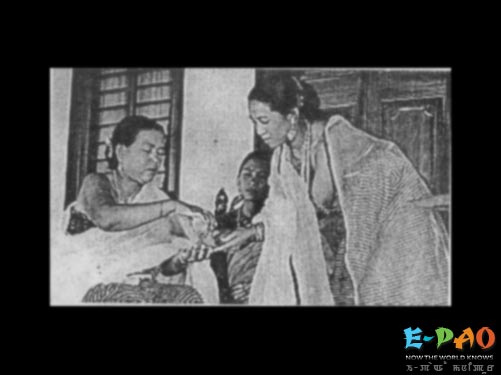How the west was won - Imagi Ningthem
Review By: R.K. Bidur *
Iqbal Masud, The Times of India film-critic sounded vilifying and teasing rather than erudite and academic when he reacted to the critical appreciation of Indian films - "Imagee Ningthem" (My Son, My Precious), "Godam" etc. by the western critics, particularly Derek Malcolm of the Guardian, London. lqbal even made a suggestion to look at the pages of Edward Said's "Orientalism" which in his opinion might be 'basic to the understanding of the subject. He reminisced a discourse with a French film critic about "Imagee Ningthem" directed by Aribam Syam Sharma which he had thought "Charming but flawed".
The French critic was enchanted with the music that was something like the music in some of their films back in 1935. He was also charmed by the ingenuous and spontaneous performances of the artistes. Iqbal opined that "Imagee Ningthem" was derivative, reflecting some of the worse features of the 'rebellious' Bengali cinema and that it also reflected an easy surrender to "mainstream culture". The French critic promptly replied that "the basis of good cinema assessment is cultural consciousness. "Imagee Ningthem" conquered Europe by its innocence and exoticism - qualities not visible in any Indian film.
Derek Malcolm wrote a rejoinder in Festival News, 13 January 1985 of the Tenth International Film Festival of India, New Delhi, "My old friend lqbal Masud wrote some very pertaining things in his article - captioned 'Under Western Eyes' in an earlier edition of the Festival News about "Imagee Ningthem". And he also - if I may say this without him spilling the next cup of coffee he offers me into my lap - wrote some impertinent things ...... What lqbal Masud described "Imagee Ningthem" to a French critic - "Charming but flawed", Derek Malcolm with a change of emphasis' responded that 'the film was charming though flawed". The difference in opinion, as Derek wrote, might be ascribed to the fact that "Masud is Indian, I am English". Derek further said that the cult of exoticism and orientalism might not be the way the Westerners' look at Indian film.

A still from "Imagi Ningthem"
Alain Jalladeau, Organiser and Director, 3 Continental Film Festival, Nantes, France also joined the fray. Of course he was the person who discovered "Imagee Ningthem" at the Filmotsav, 82 Calcutta and invited the film then and there to the Nantes Festival in that year. He said, "Imagee Ningthem", "Godam" were considered in India as small insignificant films of no great or abiding interest. For us, although they may not be perfect, their interest comes from the fact that they take simple subject where the rapport between the characters is invested with a much larger significance .....". "Imagee Ningthem" is the first Indian film to have won the Grand Prix of the Nantes Festival.
Ken Walschin, Programme Director of the London Film Festival, invited at the recommendation of Derek Malcolm "Imagee Ningthem". He said that "Imagee Ningthem" took the eye chiefly because the film's story dared to suggest that certain traditional values, often glibly criticised in the West, produce a deeper, more caring society than that of the Westerners.
"Imagee Ningthem" which was shown in New Directors, New Film, New York and at the International Film Festival, Denver, aroused enthusiasm among American ladies for a rather unexpected reason. Many of them wanted it shown in universities in the USA as an example of another solution to the conundrum of illegitimacy. May be this film from a small Indian state might point the right way, in American Universities to solving or rather dissolving the "problem" with love.
The story of "Imagee Ningthem" is simple and goes like this - a teacher comes to a village and an old man asks her to tutor his grand son who is sickly all the time. The teacher becomes curious to know about the old man and the boy. She finds out from a colleague that the boy's mother had been seduced by a man and dies in child birth. It turns out that the father is husband of her cousin who is promptly apprised of the fact.
Her cousin is attracted to the unfortunate boy and adopts him while her husband is absent. Subsequently the husband returns home and objects to the boy being adopted for he does not know it is his own son. The grand father wants to take the boy back but the step mother does not listen to it and ultimately keeps the boy. The relationship is adroitly built and developed.
Derek Malcolm, when he had seen "Imagee Ningthem" in the Panorama, Filmotsav, Calcultta 82, observed, "... one of the best films I have seen at this year's Panorama, for instance, was in Manipuri-Aribam Syam Sharma's "Imagee Ningthem". Technology? You must be joking. The film stock looked as if it was reconstituted waste paper. The images flicker almost as if they were ashamed of themselves. Nobody seemed to be able to decide at what speed to run the projector. With the consequence that even the female characters began to walk like Charlie Chaplin. Yet, 'My Son, My Precious' seemed to me to mean something quite apart from its technical deficiencies and the exigencies of its simple plot line. Ladies and Gentlemen, it was about the real people, not invented people ... it expressed something true and honourable and exciting, for all its faults ... And its very differences from the films of the West were what helped to make it fascinating to me ...
Janet Maslin, film critic, The New York Times on Wednesday, April 21, 1982 wrote "Imagine a very simple, heartfelt but threadbare "Kramer Vs. Kramer" like story set in remote corner of India. "My Son, My Precious" is something along these lines, and something genuinely and effortlessly touching ...
So much said, so much done in the West, yet strangely enough most of the Indian Press and the Critics left "Imagee Ningthem" cold. Is it because "Imagee Ningthem" was from a small community, a small state in a language not wide spread in India? Plunged in the penumbra of the cultural imperialism?
However "Imagee Ningthem" toured most of the remarkable film festivals of the world. For this little film, it was "Veni, Vidi, Vici".
